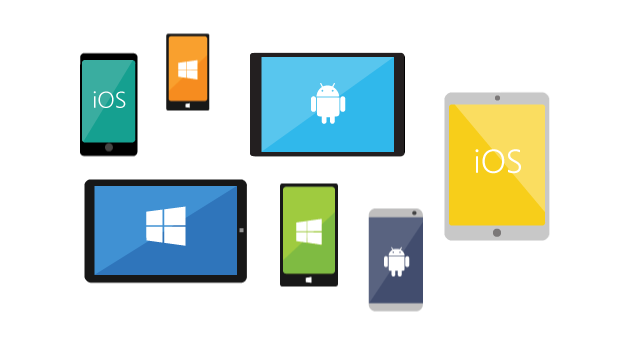Mobile apps are no longer an option, but rather, a necessity for business. Whether you are looking to build an app for the app stores or to improve productivity within your organization, mobile applications have become a must-have.
While some business owners opt for using a native mobile application, others prefer an app that can function across operating systems and mobile devices. This is where cross-platform mobile app development comes in. But, before you can go ahead and hire a professional Cincinnati Custom Software and Mobile App Development Company to build your cross-platform mobile app, there are some things that you should know.
What is a Cross-Platform Mobile App?
As the name implies, cross-platform mobile apps refer to those applications that are compatible with multiple different operating systems. Due to the complexity of writing code for one operating system that could be repurposed for other operating systems, mobile apps were once restricted to native apps. But, with the advancements of mobile technologies, app developers can now build cross-platform mobile apps.
Using a cross-platform mobile app for your business is useful because it reduces the costs of mobile development since you have a single mobile app that can be used across multiple operating systems and mobile devices. If you are still on the fence on whether or not you should get a cross-platform mobile app for your business, then here are some pros and cons to building a cross-platform mobile app.
Pros of Using a Cross-Platform Mobile App
Faster Development
Since a Cincinnati Custom Software and Mobile App Development Company only has to use one codebase that’s compatible with both Android and iOS, it results in faster development times. With cross-platform apps, there’s no need to build separate objects for iOS and Android.
Cross-platform mobile apps are built as single projects that support multiple different devices, making it easier for businesses to get their app without having to wait for too long.
Lowered Cost
Unlike native mobile apps, cross-platform app development makes it easier to reuse a large part of an app’s code between platforms; this not only results in the app being far quicker as compared to native apps, and also reduces its cost.
According to some estimates, when comparing native app development to cross-platform app development, the latter can cost up to 30% cheaper. In this way, cross-platform mobile apps are a great choice for small and medium-sized businesses that do not have a large budget that they can invest in a native app.
Used by a Wider Audience
One of the main challenges faced by many business owners is in deciding which operating system to choose for their first business app. With cross-platform app development, this is not a problem since these apps are compatible with multiple operating systems.
This is also good news for employees who often have to buy a mobile device that runs the same operating system as the business app. When creating a cross-platform mobile app, this is not an issue since employees can use the app regardless of their phone’s operating system.
Cons of Using a Cross-Platform Mobile App
Like with any other technology, along with the advantages, there are also some disadvantages of getting a cross-platform mobile app to increase your company’s productivity.
Minimized Functionality
Since the most important factor that business owners are concerned with is the performance of their mobile app, this could be a serious problem. The performance of a mobile app mainly depends on multiple factors. It is not uncommon for native mobile apps to run smoother than cross-platform applications. This is mainly because of the code that is used for native apps only needs to run on a single operating system.
This means that it does not need to take the load of running the app on two different operating systems. To mitigate this problem and ensure that your cross-platform app is able to function properly across operating systems, it is best to hire a professional Cincinnati Custom Software and Mobile App Development Company who can handle the development and testing of your mobile application.
Uses Difficult Code
One of the challenges that are faced by developers when building cross-platform apps is that they need to adapt their design to work on different operating systems. This, in turn, ends up creating extra work for the developers who have to cater to different expectations and complicated features.
This is not an issue that developers have to deal with when creating native apps. The need to use more complex code when building cross-platform apps increases the chances of bugs and other issues in the app, and can also increase the amount of time it takes to deliver a cross-platform app.
Lengthy Wait Time for Additional Features
Another major challenge that business owners are faced with when it comes to cross-platform app development is the long wait time for adding new features. Any time a new feature is introduced on the iOS or Android operating system, it takes time for the development team to update applications so that the productivity app functions properly.
Again, this problem can be avoided by hiring the expertise of a professional Cincinnati Custom Software and Mobile App Development Company who will handle all updates and new feature integrations without any hiccups.
Ending Note
It is no secret that the world has made the leap from PC to smartphones. Nowadays, almost everyone uses a mobile phone, which means that businesses that are not using mobile apps to increase their productivity are leaving money on the table. If you are a business owner that is looking to get a fully-functional productivity app, then you need to hire an experienced Cincinnati Custom Software and Mobile App Development Company.

